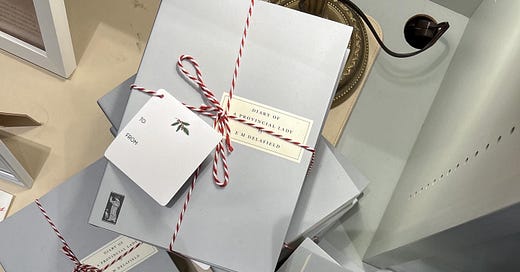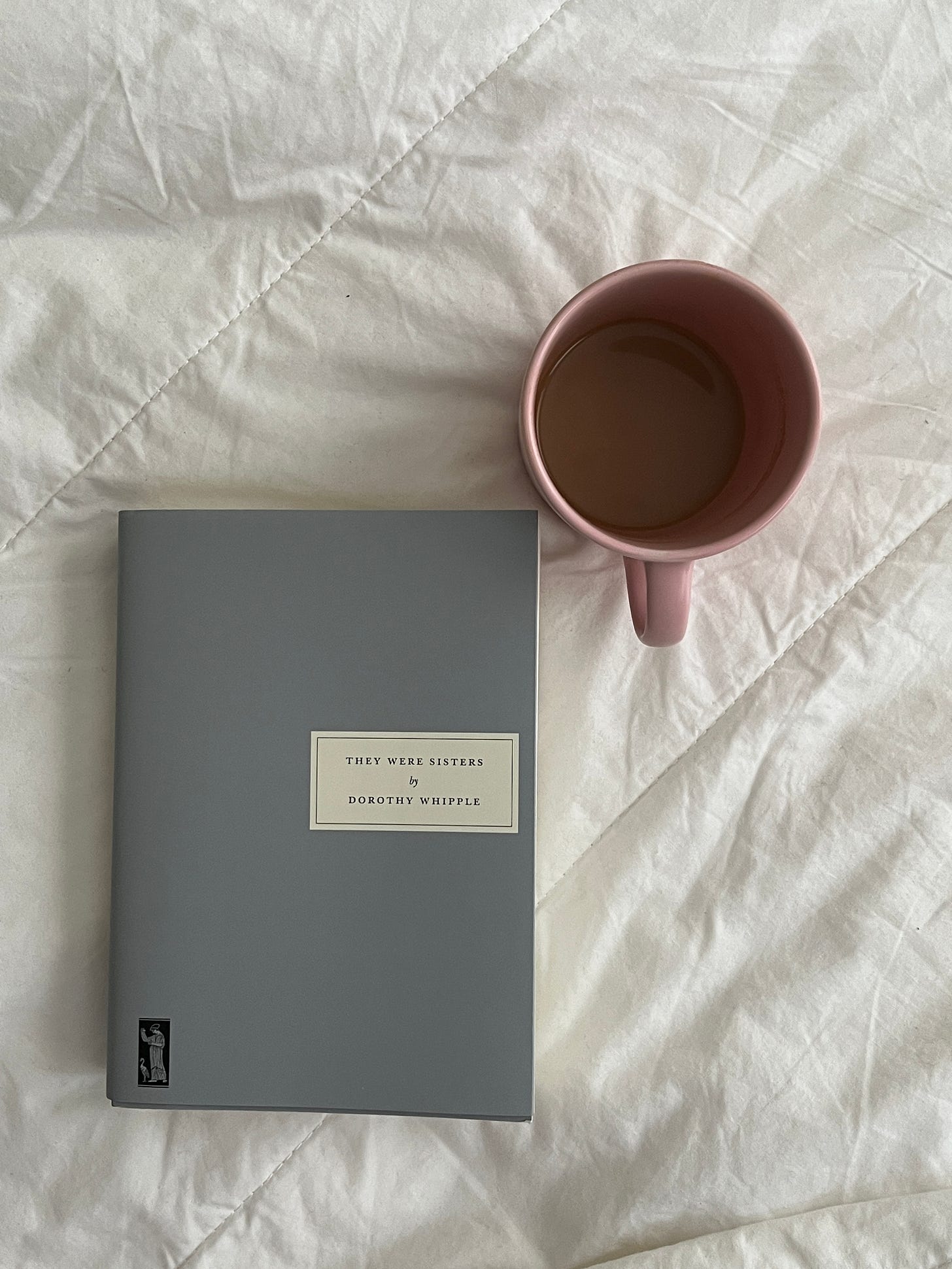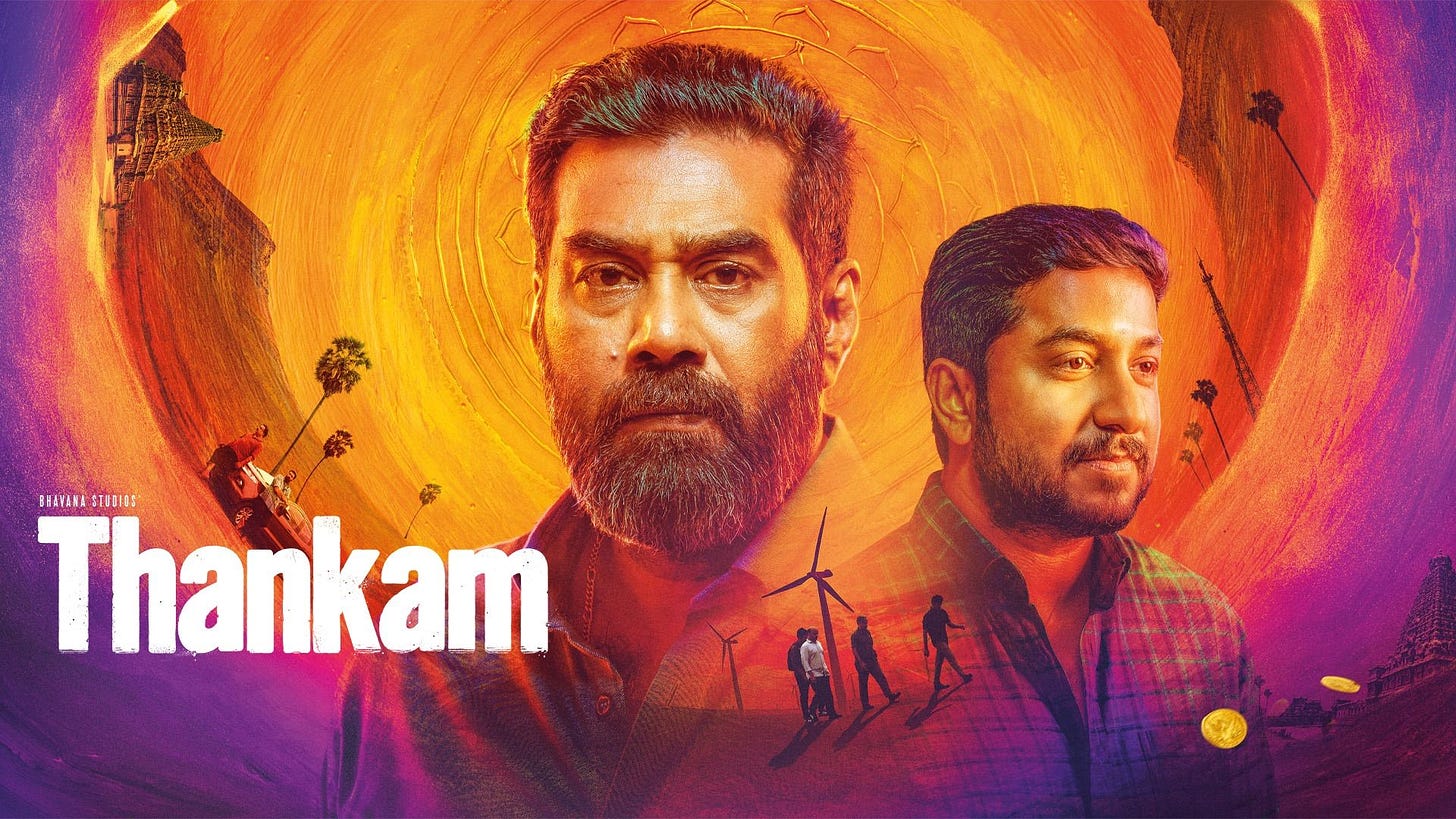Dear Reader,
How are you? I was pleasantly surprised that the last newsletter on lighting your candles resonated with so many of you. I loved seeing your updates on how you are seizing the day (*cough* material possessions) after being inspired by the letter. So touched! Thank you for including me these small life updates.
I had an amazing reading month, thanks to the library, addictive audio books (like the Hunger Games which I read for the first time and absolutely enjoyed), and the unruly weather which meant I was more or less cooped up at home. You can say I am completely addicted to fast paced books ever since. But today I want to talk about a quieter, gentler book that haunted my thoughts on many nights after I finished the book.
Read
I recently bought a Persephone book by one of my favourite writers, Dorothy Whipple. I’ve loved Whipple’s writing ever since I read my first (Someone at a Distance—an old review here). She was called “the Jane Austen of 20th century” by JB Priestly, and for good reason too. Whipple’s books are filled with astute observations, and deep emotions that make you feel personally responsible for her characters. My latest addition to the shelf was They were sisters about the three Field sisters, set in the English countryside in the time between the wars. When they lose their mother to influenza, Lucy the eldest takes up the mantle of caring for her siblings (two sisters Vera and Charlotte, and two brothers)
I loved how this book made me feel. I got frustrated with all—the ever-sacrificing motherly Lucy, the selfish and vain Vera, and the mousy Charlotte. But this isn’t just another sister-drama. Whipple takes us deeper into the minds of women—how does Lucy feel when her younger sisters get marriage proposals while she spent her youth bringing them up? How do insecurities crop up in Vera’s mind as she ages? How are love, stability and desire always at odds in the beautiful Vera’s life?
Don’t be fooled by my use of the word ‘gentle’ for Whipple’s stories. While the prose remains superficially gentle, the emotion it evokes is intense and harrowing. Charlie Lee-Potter described it as a novel that that 'exerts a menacing tone from start to finish’. Beneath the calm prose are tumultuous undercurrents of bad marriages, and fraught sisterly relationships.
Whipple’s strength lies in creating empathy for the flawed characters in the mind of the reader. Often when we wish something else happened within the pages, Whipple reminds us that her characters are all-too-human. I urged Lucy to stand up for herself but I imagined her staring back whispering ‘if not me, then who?’ I wept for Charlotte’s fall into despair and alcoholism, pushed by her abusive husband. Vera’s flights of fancy left me exasperated. I imagined her sneering with her nose up in the air—’and what right do you have to advise me?’ she might ask.
Charlotte’s husband, Geoffery, an abusive, manipulative, cold-hearted man is be one of the best villains in fiction. He is unstoppable in his cruelty both towards his wife and children, and abuse of power. Whipple examines his cruelty, not in the graphic ways of contemporary novels, but the way he makes everybody hold their breath when he enters the room. Very quickly he breaks the high spirited new bride Charlotte and makes her a woman who has to tiptoe around his tantrums. Take this example about how Whipple describes their situation—"Katherine Mansfield wrote a tale about a fly upon which a man, over and over again, idly dropped a great blot of ink. Over and over again the fly struggled out, dried its wings, worked over itself, recovered, became eager to live, even cheerful, only to be covered by another blot. At last, the fly struggled no more; its resistance was broken. Charlotte was like that fly.”
In another display of cruelty is Vera and her flirtatious ways that shake her otherwise ordinary marriage. She is never satisfied, easily bored, always unhappy, and under the delusion of an eternal, perfect life. There are so many well-written scenes that make you pause at their intensity—Geoffery’s interference with the life of his eldest daughter make her a pawn in his games; Lucy’s maid expresses her strong opinions against Lucy’s decisions and asks her to make a choice. Two cousins share secrets with one another and wonder what’s love. In one of the early chapters, Lucy who never had time for herself thinks about hairstyles and her sisters.
The novel spans decades, introducing us to Charlotte’s and Vera’s children and how their mothers (and home) affect them. I loved Whipple’s careful construction of Lucy’s maternal instinct sitting warmly with her peaceful marriage from which she has no children. Lucy remains the kindest soul. She takes a greater interest in the lives of her nieces and nephews than their own mothers, making the children consider her as the reliable and responsible adult. She takes pleasure in reading books, walking around the countryside and is often all-consumed by the problems of others.
I was disappointed that Whipple focused on the marriages of Vera and Charlotte in great detail, but Lucy’s story was always interrupted by her concern for others.
I wanted to know more about Lucy and her husband William. Lucy was always trying so hard, constantly under appreciated for her efforts, and taken for granted. But by the end of the novel, I accepted, that Lucy’s life, as the eldest sister, will always be interrupted. She is the one to whom everyone unloads their problems, she is the one who has to rush to the other’s side to solve issues, she is the one who gives advice with a good heart but is unheeded. Her marriage is never just her and William, but it comes with the baggage of her motherly affections to her sisters and their children. Lucy and William simply complement one another in a mature, respectful, loving relationship, and therein lies her happiness.
Nobody writes domestic drama resplendent in its turbulent beauty like Whipple. If you enjoy books like The Light Years by Elizabeth Jane Howard, you would love this book. Or if you are new to Whipple, I recommend Someone at a Distance to begin with.
Asian Books of 2023
The title says it all. No more excuses that you can’t find Asian books to add to your reading list. Bookmark and read your way through this list of 70+ new Asian books.
Read women this month
Join me on Instagram (or other socials) for #femmemarch where we appreciate writers, artists, friends and inspiring women in your life. There’s a simple reading challenge too. Check out more details here. And let’s read together.
Watch
I wish there would be more movies like the Malayalam movie Thankam (transl. Gold) where Mumbai police investigate a crime in Tamil Nadu involving gold smugglers from Kerala. It is written by Syam Pushkaran (Kumbalangi Nights fame), directed by Saheed Arafath, and stars Biju Menon, Vineeth Sreenivasan and Aparna Balamurali in lead roles.
Thankam is a beautiful medley of language, peppered with Marathi, Malayalam, Hindi, Tamil and English. Often the characters in conversation are not proficient in the same language, but convey ideas with a mix of gestures and few words. I found this depiction of diversity of languages and how we coexist in spite of it, utterly beautiful. Thankam is witty in parts, unreliable and keeps you guessing. The gold smuggling is only a backdrop and the real focus is on humans who are puppets of fate. Thankam also breaks down a few stereotypes related to English proficiency, and South Indians’ knowledge of Hindi. It is essentially a murder mystery but by the end you’ll forget about the crime, smuggling and the outside world. You’ll find yourself teary eyed for the circumstances that the common man finds himself in.
Amazing links
by yours truly—I could knit a beanie
Why does everything on Netflix look like that
The novel as a meme page (or) The novelist as a curator
The last man without a cell phone
The Instagramification of indie small business/stores—Will the jarred condiment be woke, aligned with a cool chef, or “artisanal” in some way?
I hope your Feb was filled with love etc,
Until next time,
Resh x







